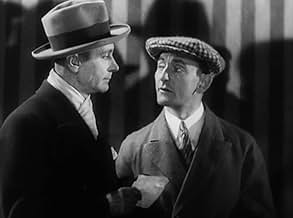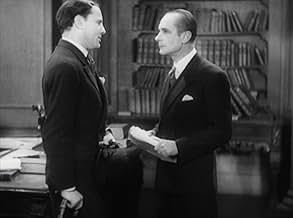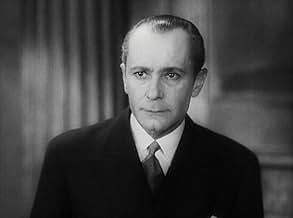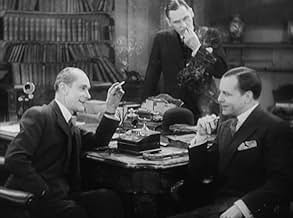Mary
- 1931
- 1 घं 18 मि
IMDb रेटिंग
5.7/10
1.1 हज़ार
आपकी रेटिंग
अपनी भाषा में प्लॉट जोड़ेंA juror in a murder trial, after voting to convict, has second thoughts and begins to investigate on his own before the execution.A juror in a murder trial, after voting to convict, has second thoughts and begins to investigate on his own before the execution.A juror in a murder trial, after voting to convict, has second thoughts and begins to investigate on his own before the execution.
John Mylong
- John Stuart
- (as Jack Mylong-Münz)
फ़ीचर्ड समीक्षाएं
A woman is found murdered with another woman, Mary Baring, with whom she'd been heard to be arguing, present, in a daze. It seems like an open-and-shut case and Baring is put on trial for murder. During deliberations, 11 of the 12 members think she's guilty. The sceptical one is Sir John Menier who thinks there are holes in the case. However, he is talked round and Baring is found guilty. After the case Menier still has his doubts and wishes he'd been more forceful in arguing against a guilty verdict. He starts to do his own investigating.
In 1930 Alfred Hitchcock released Murder!, an intriguing murder-thriller. While Murder! Was being shot, Hitchcock was simultaneously making Mary, a German-language version of it, using the same sets but German actors. Mary is almost frame-for-frame and word-for-word (once translated!) the same as Murder! Though manages to run 19 minutes shorter. German must be a more succinct language than English...
The end result is almost as good as Murder! An original start, introducing much of the circumstances around the murder via a murder trial and introducing the main character, Menier, through the jury's deliberations.
The plot developments are good and the climax is quite Shakespearean, which is appropriate considering that the setting is the theatre and most of the characters are theatre actors and crew.
I watched the two films less than day apart and Murder! Was fresh in my mind when I watched Mary. Production values seem a bit lower on Mary and Hitchcock makes less use of clever camera angles in Mary. On the plus side, the irritating smash cuts in Murder! Are not there in Mary. Being longer, Murder! Seems more tension-filled too.
The subtitling on the version of Mary I watched was quite shonky, which also detracted from the film.
Now for the big question: why did Hitchcock make a German version of Murder!? I guess that sound in movies was so new and primitive that simply dubbing Murder! Into German wasn't an option. In the silent era a movie could easily be adapted into another language - just change the dialogue cards!
But why bother at all? My guess is that Germany was a large cinematic market and/or Hitchcock had a large fan base in Germany, hence a film specifically for that market. It's like (30 years later) the Beatles re-recording and releasing many of their early stuff in German.
It's worth noting that this was the one and only time Hitchcock made a foreign-language version of one of his movies. Either Mary wasn't as good an idea as he imagined or technology improved and soon after this his films were dubbed or sub-titled for foreign audiences.
In 1930 Alfred Hitchcock released Murder!, an intriguing murder-thriller. While Murder! Was being shot, Hitchcock was simultaneously making Mary, a German-language version of it, using the same sets but German actors. Mary is almost frame-for-frame and word-for-word (once translated!) the same as Murder! Though manages to run 19 minutes shorter. German must be a more succinct language than English...
The end result is almost as good as Murder! An original start, introducing much of the circumstances around the murder via a murder trial and introducing the main character, Menier, through the jury's deliberations.
The plot developments are good and the climax is quite Shakespearean, which is appropriate considering that the setting is the theatre and most of the characters are theatre actors and crew.
I watched the two films less than day apart and Murder! Was fresh in my mind when I watched Mary. Production values seem a bit lower on Mary and Hitchcock makes less use of clever camera angles in Mary. On the plus side, the irritating smash cuts in Murder! Are not there in Mary. Being longer, Murder! Seems more tension-filled too.
The subtitling on the version of Mary I watched was quite shonky, which also detracted from the film.
Now for the big question: why did Hitchcock make a German version of Murder!? I guess that sound in movies was so new and primitive that simply dubbing Murder! Into German wasn't an option. In the silent era a movie could easily be adapted into another language - just change the dialogue cards!
But why bother at all? My guess is that Germany was a large cinematic market and/or Hitchcock had a large fan base in Germany, hence a film specifically for that market. It's like (30 years later) the Beatles re-recording and releasing many of their early stuff in German.
It's worth noting that this was the one and only time Hitchcock made a foreign-language version of one of his movies. Either Mary wasn't as good an idea as he imagined or technology improved and soon after this his films were dubbed or sub-titled for foreign audiences.
It is late night when the dwellers of a street hear a scream in the apartment of the actress Mary Baring (Olga Tschechowa). A police officer arrives, and the neighbors see Mary dazed and confused, with blood on her clothes and on a poker, and the body of her colleague Ellen Moore on the floor. An empty bottle of brandy is on the table and Mary is in shock with no recollection of what happened. The drunken Mr. Moore says that Mary and Ellen were rivals in the theater and the police take Mary to the precinct. There is a trial, and the jurors believe Mary is guilty, but the famous actor Sir John Menier (Alfred Abel) believes she is not guilty. However, he is not able to change the position of the other jurors and is forced to change his vote to guilty. Mary is sentenced to the gallows, but Sir John decides to conduct his own investigation to prove that Mary is innocent.
"Mary" (1931) is a German spoken remake of "Murder!" (1930) that was shot simultaneously on the same sets of "Murder!" by Alfred Hitchcock with a German-speaking cast. The plot is interesting, about a murder and the woman accused and considered guilty by the jurors. There is one moment, when Sir John Menier exposes his opinion, that seems to be the inspiration to "12 Angry Men" (1957) when only one juror disagrees from the others. The real killer is a weird guy, wearing a dress to perform at the circus. After watching "Mary", I have finally finished to see or see again all the Alfred Hitchcock features and written a review in IMDb for each one. My vote is seven.
Title (Brazil): "Mary"
"Mary" (1931) is a German spoken remake of "Murder!" (1930) that was shot simultaneously on the same sets of "Murder!" by Alfred Hitchcock with a German-speaking cast. The plot is interesting, about a murder and the woman accused and considered guilty by the jurors. There is one moment, when Sir John Menier exposes his opinion, that seems to be the inspiration to "12 Angry Men" (1957) when only one juror disagrees from the others. The real killer is a weird guy, wearing a dress to perform at the circus. After watching "Mary", I have finally finished to see or see again all the Alfred Hitchcock features and written a review in IMDb for each one. My vote is seven.
Title (Brazil): "Mary"
The Hitchcock/Truffaut book,which is actually a very long interview ,something like "the Beatles anthology" in pop music ,gives us many interesting informations about "Mary" ,a movie the master liked.Although he told Truffaut he detested the whodunits ,those riddles a la Agatha Christie,"Mary" featured "things we did for the first time":stream of consciousness,play in the play a la "Hamlet" references to transvestism and even hints at (veiled) homosexuality,which was a "crime" in Great Britain as it was in Germany at the time....
That said,the story drags on a bit and the running time could have been boiled down to one hour,which would have enhanced the really good scenes: IT was Herbert Marshall's first talkie and the scene when he's shaving and thinking for a clue renews the way the detective investigates.The unfinished manuscript is also a very good idea.But the bravura passage remains the final circus.One can also note the scene of the verdict we hear from the empty juror's room.
There are elements which would appear later in Hitchcock's work: the theater ("Stage fright",also a whodunit,btw),of course "Psycho" (a man in drag) and "vertigo" (the finale which makes you feel dizzy).
This is another early Hitchcock which is not only for completists.
That said,the story drags on a bit and the running time could have been boiled down to one hour,which would have enhanced the really good scenes: IT was Herbert Marshall's first talkie and the scene when he's shaving and thinking for a clue renews the way the detective investigates.The unfinished manuscript is also a very good idea.But the bravura passage remains the final circus.One can also note the scene of the verdict we hear from the empty juror's room.
There are elements which would appear later in Hitchcock's work: the theater ("Stage fright",also a whodunit,btw),of course "Psycho" (a man in drag) and "vertigo" (the finale which makes you feel dizzy).
This is another early Hitchcock which is not only for completists.
This is the only time in Alfred Hitchcock's career that he remade one of his own films in another language; just like in "Murder" (1930), there is one piece of brilliant filmmaking (the entire jury sequence), but the rest of the film is dull, primitive and plodding - strictly for Hitchcock completists. Mary (Olga Tschechowa) is very beautiful. ** out of 4.
I am never entirely decided which out of John Ford and Alfred Hitchcock should be regarded as the most hugely over-rated director of all time. Sometimes I tend one way, sometimes the other.
It is not that Hitchcock did not make some very fine films; evidently he did. But he made some rather poor films too, particularly at the beginning and during the long end of his career. And even some of his good films are in doubtful taste and overly reliant on trademark gimmicks. The sycophantic attitude adopted by his admirers (the gullible idolator François Truffaut en tête) bear witness as much as anything to to his dominant personality and extraordinary talents as a self-publicist.
Neither the 1930 British version of this film nor the German version (shot simultaneously but only released in 1931) are very good. According to one reviewer the Germans would have liked more changes and this I can well believe. Hitchcock, who had learned most of what he knew from German film-makers really does not take advantage of the opportunity to be more adventurous in his cinematography and mise en scène in the way that marks the films of the great German directors up to this time (a golden age soon alas to be robbed of its glitter by the folly and philistinism of one Herr Hitler). Using German technical skills, he could have made a much superior version of this film.
Some changes the Germans did get. The British version is very seriously by the extremely unpleasant racist and homophobic tone of its conclusion (the villain being very clearly marked as a half-caste pansy to be ostracised on both accounts). As, to my astonishment - how protective people are of their icons! - only one reviewer to date seems to have pointed out, these unpleasant elements are removed in the German version. The character still works as an acrobat en travesti but the notion that he is homosexual (derived from the Dane novel) is hardly there at all and his motive for murder is no longer to conceal that he had "black blood" as in the English version (a notion that did not horrify the German public who, even under Hitler and whatever Hitler may have thought of it, gave a hugely warm and enthusiastic welcome to the athlete Jesse Owens five years later as Owens himself would testify sardonically on his return to a segregated USA. In this version Fane is simply an ex-convict wishing to conceal his criminal past.
It is easy to read history backwards in the manner of the egregious Siegfried Kracauer and forget that the Weimar period in Germany was in fact notable for its broad-mindedness (films treating homosexuality with sympathy such as Oswald's Anders als die Andern - which is also a plea for a change in the law - Dreyer's Michaêl or Dieterle's Geschlecht in Fesseln simply could not have been made at all in Britain at this time) and its multiculturalism. When the anti-semitic British short-story Saki had imagined a German invasion of Britain in his 1913 novel When William Came, what he feared most was not militarism or autocracy but the spread of a "cosmopolitan" culture (typically a euphemism for "jew" at the time) that would undermine the British identity.
Regarding Hitchcock and race, how many African American faces can you recall seeing in all the films that "the Master" made in the US, a period that included the life and death of Martin Luther King, the Civil Right movement, the Johnsonian legislation that transformed US society, the heyday of Mohamed Ali, the Black Panther movement?
So these important changes to this film are a reminder that as late as 1931 racism and homophobia that was perfectly acceptable in Britain was considered inappropriate in Germany. Two years later, alas, and both German state and cinema would be in the hands of suicidal and homicidal fanatics. Quel gachis!
It is not that Hitchcock did not make some very fine films; evidently he did. But he made some rather poor films too, particularly at the beginning and during the long end of his career. And even some of his good films are in doubtful taste and overly reliant on trademark gimmicks. The sycophantic attitude adopted by his admirers (the gullible idolator François Truffaut en tête) bear witness as much as anything to to his dominant personality and extraordinary talents as a self-publicist.
Neither the 1930 British version of this film nor the German version (shot simultaneously but only released in 1931) are very good. According to one reviewer the Germans would have liked more changes and this I can well believe. Hitchcock, who had learned most of what he knew from German film-makers really does not take advantage of the opportunity to be more adventurous in his cinematography and mise en scène in the way that marks the films of the great German directors up to this time (a golden age soon alas to be robbed of its glitter by the folly and philistinism of one Herr Hitler). Using German technical skills, he could have made a much superior version of this film.
Some changes the Germans did get. The British version is very seriously by the extremely unpleasant racist and homophobic tone of its conclusion (the villain being very clearly marked as a half-caste pansy to be ostracised on both accounts). As, to my astonishment - how protective people are of their icons! - only one reviewer to date seems to have pointed out, these unpleasant elements are removed in the German version. The character still works as an acrobat en travesti but the notion that he is homosexual (derived from the Dane novel) is hardly there at all and his motive for murder is no longer to conceal that he had "black blood" as in the English version (a notion that did not horrify the German public who, even under Hitler and whatever Hitler may have thought of it, gave a hugely warm and enthusiastic welcome to the athlete Jesse Owens five years later as Owens himself would testify sardonically on his return to a segregated USA. In this version Fane is simply an ex-convict wishing to conceal his criminal past.
It is easy to read history backwards in the manner of the egregious Siegfried Kracauer and forget that the Weimar period in Germany was in fact notable for its broad-mindedness (films treating homosexuality with sympathy such as Oswald's Anders als die Andern - which is also a plea for a change in the law - Dreyer's Michaêl or Dieterle's Geschlecht in Fesseln simply could not have been made at all in Britain at this time) and its multiculturalism. When the anti-semitic British short-story Saki had imagined a German invasion of Britain in his 1913 novel When William Came, what he feared most was not militarism or autocracy but the spread of a "cosmopolitan" culture (typically a euphemism for "jew" at the time) that would undermine the British identity.
Regarding Hitchcock and race, how many African American faces can you recall seeing in all the films that "the Master" made in the US, a period that included the life and death of Martin Luther King, the Civil Right movement, the Johnsonian legislation that transformed US society, the heyday of Mohamed Ali, the Black Panther movement?
So these important changes to this film are a reminder that as late as 1931 racism and homophobia that was perfectly acceptable in Britain was considered inappropriate in Germany. Two years later, alas, and both German state and cinema would be in the hands of suicidal and homicidal fanatics. Quel gachis!
क्या आपको पता है
- ट्रिवियाA copy of the film is included as a bonus feature on the Kino Lorber Studio Classics DVD and German DVD releases of Murder! (1930) and the French DVD release of Jamaica Inn (1939).
- गूफ़As Sir John interviews Mary in jail, it is established in long-shot that both are sitting at opposite ends of a long table. During frontal closeups, the widths of the planks that make up the tabletop reveal that very randomly either the table is turning between shots or both persons repeatedly switch places.
The exact same continuity error also applies to the American version of the movie, Murder! (1930).
टॉप पसंद
रेटिंग देने के लिए साइन-इन करें और वैयक्तिकृत सुझावों के लिए वॉचलिस्ट करें
विवरण
- रिलीज़ की तारीख़
- कंट्री ऑफ़ ओरिजिन
- भाषा
- इस रूप में भी जाना जाता है
- Secreto de la noche
- फ़िल्माने की जगहें
- उत्पादन कंपनी
- IMDbPro पर और कंपनी क्रेडिट देखें
- चलने की अवधि
- 1 घं 18 मि(78 min)
- रंग
- पक्ष अनुपात
- 1.20 : 1
इस पेज में योगदान दें
किसी बदलाव का सुझाव दें या अनुपलब्ध कॉन्टेंट जोड़ें































